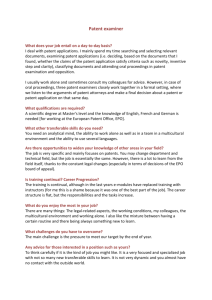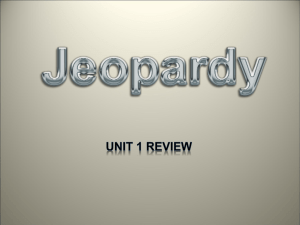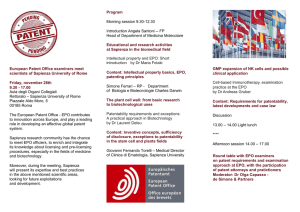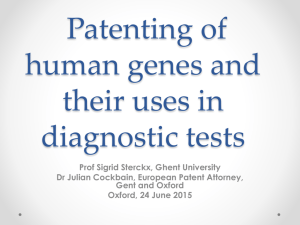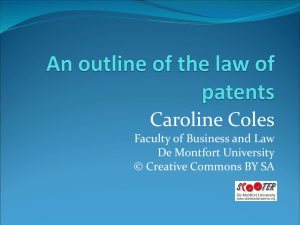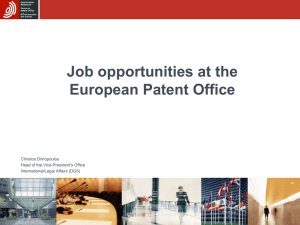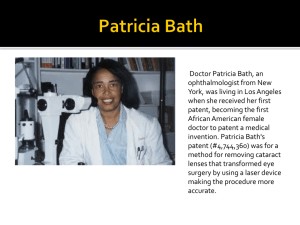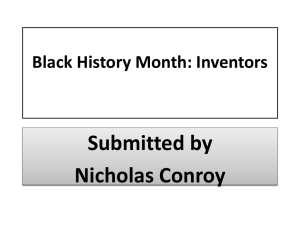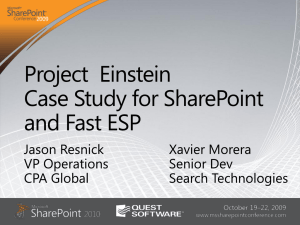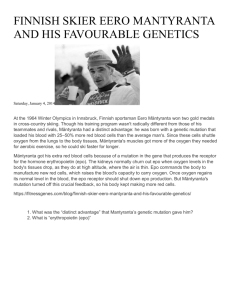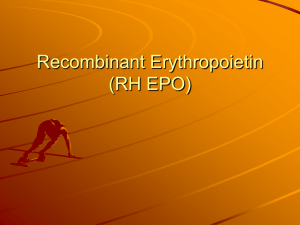Das Europäische Patentamt
advertisement
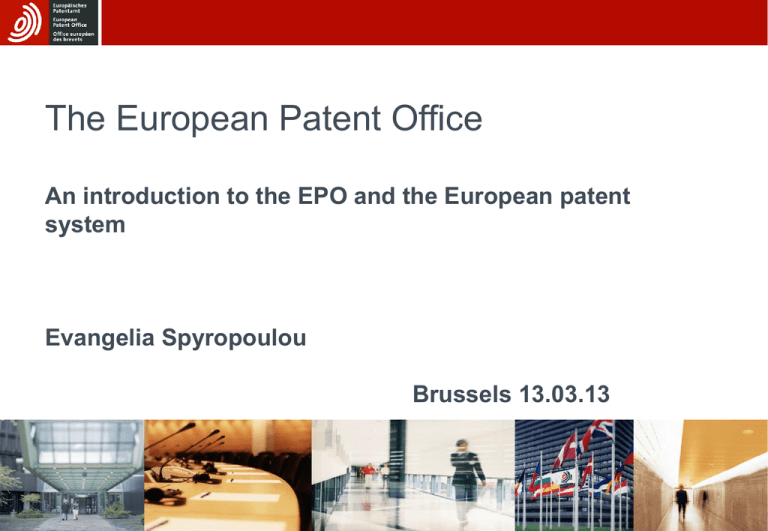
The European Patent Office An introduction to the EPO and the European patent system Evangelia Spyropoulou Brussels 13.03.13 12/03/13 Overview of intellectual property rights Legal right What for? How? Patents New inventions Application and examination of the application Copyright Original creative or artistic forms Exists automatically Trade marks Distinctive identification of products or services Use and/or registration Registered designs External appearance Registration* © The Coca-Cola Company Trade secrets Valuable information not known to the public Reasonable efforts to keep secret Example: one mobile phone; several IP rights Trade marks: Made by "Nokia" Product "N95" Software "Symbian", "Java" Patents: Data-processing methods Semiconductor circuits Display Trade secrets: ? Copyrights: Software code Instruction manual Ringtones Designs (some of them registered): overall shape of phone arrangement of buttons in an oval configuration three-dimensional waveform of buttons © Nokia What is a patent? A patent is a legal title granting its holder the right to prevent third parties from exploiting an invention for commercial purposes without authorisation In return for this protection, the holder has to disclose the invention to the public Protection is granted: • for a limited period, generally 20 years • for a specific geographic area Reveal inventio n Get exclusivit y What can be patented at the European Patent Office? Inventions that are… • new to the world (no previous public notice) • inventive (i.e. not an "obvious" solution) • susceptible of industrial application NOT: • Mere ideas not reduced to practice • Software as such • (but algorithms that achieve technical results) • Business methods • Medical therapies, plant varieties, etc. • … See Articles 52 and 53 EPC in http://www.epo.org/patents/law/legal-texts/epc.html Patent requisites What does a patent look like? – Bibliographic information Inventor, proprietor, date of filing, technology class, etc. – Description Summary of prior art (i.e. the known existing technology) The problem that the invention is supposed to solve An explanation and at least one way of carrying out the invention – Claims Define the extent of patent protection – Drawings Illustrate the claims and description – Abstract Around 150 words as a search aid for other patent applications Structure of the description Prior art • Teapot with one spout Drawback of prior art • Time-consuming Problem to solve • Reduce filling time Solution • Provide a second spout Advantage of the invention • The time needed to fill multiple cups is reduced The first European patent 1980 The first European patent was granted to German systems manufacturer Scheidt & Bachmann. The invention related to a device for the temporary storage of coins for use in ticket machines. What not to do when considering filing a patent application • No publication prior to filing e.g. no article, press release, conference presentation/poster/proceedings or blog entry • No sale of products incorporating the invention prior to filing • No lecture or presentation prior to filing except under a non-disclosure agreement (NDA) • Seek professional advice soon! • File before others do! Important: Secrecy until the date of filing! Beware of • • • • Company Journal Samples Prototypes Displays • • • • • Trade Fairs "Open Door" events Publicity Visitors etc... 38 member states Albania • Austria • Belgium • Bulgaria • Croatia • Cyprus • Czech Republic • Denmark • Estonia • Finland • France • Germany • Greece • Hungary • Iceland • Ireland • Italy • Latvia • Liechtenstein • Lithuania • Luxembourg • Former Yugoslav Republic of Macedonia • Malta • Monaco • Netherlands • Norway • Poland • Portugal • Romania • San Marino • Serbia • Slovakia • Slovenia • Spain • Sweden • Switzerland • Turkey • United Kingdom European patent applications and patents can also be extended at the applicant's request to the following states: Bosnia-Herzegovina • Montenegro Autonomy Second largest intergovernmental institution in Europe Not an EU institution Self-financing, i.e. revenue from fees covers operating and capital expenditure EPO Locations The EPO has offices at five different locations. Its headquarters are in Munich. EPO Locations Munich - Headquarters Vienna The Hague Berlin Brussels - Bureau Highly skilled examiners Top-level engineers and scientists • high degree of technical expertise • knowledge of the EPO's three official languages Training during first two years • extensive legal and procedural training • individual coaching by experienced examiners Continuing professional development throughout career European Inventor Award 2006 - 2012 The annual European Inventor Award is organised by the EPO in co-operation with the EU Council Presidency and the European Commission. The award recognises inventors and their groundbreaking inventions for their contribution to society and the economy. Laureates include Peter Grünberg, subsequent winner of the Nobel Prize in Physics, and Eric de Clerq, developer of some of the original drugs against HIV. Need more information? www.epo.org info@epo.org Tel. + 49 (0)89 2399 - 4636
